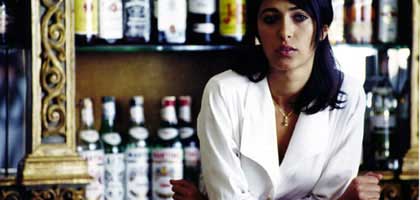
Hotel terminus
Film of the Month: The Consequences of Love

The hero of 'The Consequences of Love' is an emotionless middle-aged man confined to an anonymous Swiss hotel. Philip Kemp enjoys his stay.
"I am not a frivolous man," Titta di Girolamo tells us in voiceover. We scarcely need the information. Taciturn, withdrawn, always impeccably dressed, his lips pursed in a fixed expression of fastidious disdain, he seems the personification of solemnity, a man of meticulous, joyless routine for whom the world and everything in it is a source of nothing but weary distaste. In Toni Servillo's mesmerising portrayal, he comes over like a cross between Peter Sellers in Being There and Philip Larkin at his most aloof. When, midway through the film, he sits for the first time at the hotel bar, commenting sardonically that it may be "the most dangerous thing I've done in my life", and offers the barmaid Sofia the faintest suspicion of a smile, the effect is unnerving, as though a stone statue had grinned.
The Consequences of Love (Le conseguenza dell'amore) is the tale of a man whose life has been stolen from him - severed from his family, he's condemned to an existence of eternal boredom in a nowhere hotel in Switzerland to punish him for an error that cost the Mafia a lot of money. Like its lead actor's performance, the film offers a masterclass in impeccable control that rarely weakens. Paolo Sorrentino's second feature (his first, L'uomo in più/One Man Up, also starred Servillo) rises to the challenge of portraying a sterile, emotionless life without either boring or alienating his audience. This he does with teasing subtlety. Well before the arrival of the mysterious cash-filled suitcase, small hints and nuances pique our curiosity, suggesting something hidden behind Titta's buttoned-up facade. Rebuffing the nosiness of our surrogate, a garrulous fellow-guest, Titta tells blatant lies about himself, responding when challenged: "The truth, my friend, is boring." Now and then Sorrentino lets his camera dwell for a fraction longer than expected on a small detail, like a hearse passing in the street or the push-button panel that controls the hotel's lifts - portents of events to come. Further undertones of insecurity are filtered through the nervy, techno-flavoured score and the precisely calibrated editing with its disconcerting match-cuts.
Above all, though, it's the deployment of screen space (and offscreen space) that gives the film its compelling, distinctive quality. Luca Bigazzi's fluid camera roams around the pristine corridors and public spaces of Titta's soulless Swiss hotel, emphasising walls, windows and doorways and mapping out its dimensions in such a way as to convey, even before it's confirmed to us, that it is in effect his prison. Sorrentino favours insidious, inexorable forward tracking shots (since a forward track, rather than the easier zoom-in, redefines perspective and alters spatial relationships) to reinforce the sense of entrapment and unspecified unease. At other times the camera, having remained coolly reticent for a few moments, abruptly swerves to reframe the scene from an unexpected angle, prompting us to reconsider our viewpoint.
On the rare occasions when Titta leaves his hotel (apart from his weekly delivery job to the bank) he's to be found wandering round the equally sterile, closed-off spaces of a modern, near-deserted shopping mall, taking in displays of luxury merchandise or a passing soignée blonde with much the same disenchanted, faintly wistful gaze. Until the final showdown, in the bleak setting of a cement quarry, we never see him in the open air, still less in the countryside; the idea of the "trip to the mountains" Sofia promises him is so incongruous we can guess at once it'll never happen. Even when he is flown south to explain himself to the Mafia bosses, Titta finds himself incarcerated in yet another anonymous luxury hotel. ("I can't break free of hotels," he comments wryly.) Not quite anonymous, though, as a brief shot reveals that it's called the Hotel New Europe - hinting that, new or old, organised crime's stranglehold on the continent is as tenacious as ever.
Consequences must be one of the most understated Mafia movies ever made, conveying the organisation's chilling power all the more effectively by focusing (as did Mike Newell's underrated Donnie Brasco) not on the bosses but on a minor, marginal figure trapped in the pitiless cogs of its workings. This oblique view, leaving us to imagine what kind of terror causes a man to submit to eight years of living death under no visible coercion, is far more telling than any amount of explicit violence. In fact, those episodes where the violence does become overt - when we witness one of the two visiting hitmen gunning down his victims, and later when Titta is suddenly transformed into Action Man, ambushing and killing the two thugs and regaining the stolen suitcase - feel like a lapse of confidence on the part of the director, a superfluous spelling out of what we've already registered.
By contrast, the long steadicam sequence (a nod, maybe, to Scorsese's famous tour-de-force shot in GoodFellas) where Titta is taken to confront the top Mafiosi is played out with restraint and quietly subversive humour. His sober-suited figure is escorted through the echoing expanses of the hotel - no less sterile than the one he inhabits, though vaster and more grandiose - with square-shouldered, stony-faced thugs stationed impassively at regular intervals all along his route. And the assembled elderly capos, when he finally encounters them, are seated behind a long trestle table like some academic examination board, while above them a banner mockingly announces: "Hypertrophy of the Prostate - Introductory Course".
Despite being so understated, Servillo's unblinking performance dominates the film. But as the barmaid Sofia, object of his diffident attraction, Olivia Magnani (granddaughter of the great Anna) brings such warmth and presence to her underwritten role that it's wholly credible she should succeed in thawing Titta's detachment. There's a sense of loss when she's suddenly written out of the story - rather arbitrarily, one can't help feeling, as if Sorrentino wasn't quite sure what to do with her once she'd served his immediate purpose. The film also offers a diverting cameo from another scion of a prominent Italian acting dynasty: Adriano Giannini, son of Giancarlo, as Titta's improbable surfing-instructor half-brother Valerio, who drops in en route to the Maldives. Titta regards this bronzed, bouffant-haired phenomenon with even more than his usual icy disdain. "You always were a superficial man," he observes - from him, evidently the ultimate condemnation. Yet it's Valerio, with his brash propositioning of Sofia, who precipitates the momentous change in Titta's life.
Not that, despite the film's title, it's only the attraction of Sofia that nudges Titta out of his carefully contained stasis. His resentment at the vulgar irruption of the two hired killers into his ordered life also helps push him into rebellion: "I've stopped losing," he mutters, exposing the card-cheating of a fellow-guest. Just as an exercise in style, Consequences would be exceptional, but in its second half, as events gather momentum, it creates a compelling sense of existential vertigo, like a fatal fall captured in the most deliberate slow-motion - and it's just such a fall, as it turns out, that Titta suffers in his eventual slow, lonely death. A death bizarrely consoled by the knowledge that he's restored the fortunes of two people he doesn't even much like - and by the memory of a 'best friend' he hasn't spoken to in 20 years.
